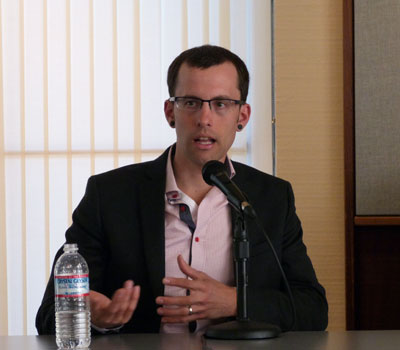Shane Bauer tackles ‘The Prison Problem’
One of three hikers — including fellow UC Berkeley alums Josh Fattal and now-wife Sarah Shourd — who were captured and held in an Iranian prison, journalist Shane Bauer is hoping to crowdfund a year’s worth of reporting on U.S. prisons.

April 25, 2014
During his four months in solitary confinement in an Iranian prison, Shane Bauer recalled this week, “I would say to the guards, ‘Why don’t you take me out of solitary? Why am I here?’ And they’d say, ‘Well, how long are people in solitary in Guantanamo?’

Bauer: “A lot of the ways we’ve been using incarceration… haven’t been working.”
“Then, after two years, I was saying, ‘Why aren’t you taking me to trial?’ And they’d say, ‘How long do people go without trial in Guantanamo?’
“Obviously, this wasn’t a good enough reason, for me, for them to be holding me there, it was just kind of an excuse for them to be holding somebody they knew was innocent,” added Bauer. “But it’s hard to argue against that kind of thing.”
Bauer, a 2007 honors graduate in peace and conflict studies, was one of three hikers — including fellow UC Berkeley alums Josh Fattal, a friend, and Sarah Shourd, who’s now his wife — who were captured, during a 2009 outing in the autonomous region of Iraqi Kurdistan, by soldiers “who turned out to be Iranian.” Bauer, who had done reporting in the Middle East, was living in Damascus, Syria, and had been directed to a local tourist site by a hotel manager and a taxi driver. Locals, in turn, pointed out a trail the three might enjoy.
But the locals, Bauer said, may not have expected the trio to hike for more than four hours, an excursion that took them right to the Iranian border — and then to prison, where Bauer was held for 26 months until his release, with Fattal, in September 2011. (Shourd was released a year earlier.)
“I thought maybe this would last a day or two, and we’d get out,” he said. “I had no idea I’d be there for two years.”
On Tuesday, at a campus appearance hosted by the Human Rights Center and titled “The Prison Problem,” Bauer described solitary confinement as “kind of an abyss” in which activities like memorizing Morse Code from a dictionary helped pass the time. “There’s this process where I’m trying to do things that are meaningful,” he explained, “and in that situation I convinced myself that someday Morse Code’s going to be useful.”
Crowdfunding a year of reporting on prisons
Today, living in Oakland, Bauer is finding his skills as a reporter and photographer far more useful. In October 2012 he published a story in Mother Jones magazine under the headline “Solitary in Iran Nearly Broke Me. Then I Went Inside America’s Prisons,” based on reporting he’d done on California’s Pelican Bay supermax prison.
Now Bauer’s hoping to crowdfund a year’s worth of reporting on U.S. prisons through a subscription-journalism enterprise called Beacon, whose co-founder, Dan Fletcher, appeared with him in conversation Tuesday at Boalt Hall. In addition to the human impacts of solitary confinement, he said, he’s especially interested in looking into how U.S. companies are building private prisons in countries like Mexico and Singapore, and the effects of budget cuts on health care for inmates.
The United States, he said, “has more prisoners than any country in the world,” and “more people in solitary confinement than any country in the world.” Citing high rates of recidivism, he added, “A lot of the ways we’ve been using incarceration to deal with our problems of crime haven’t been working.”
Describing himself as a “longform journalist,” Bauer suggested Beacon could be an outlet for shorter, more personal pieces throughout the year, while he works on in-depth magazine pieces that would be accessible to non-subscribers.
And though he stressed the importance of working independently, he knows the issue isn’t an easy sell for a U.S. readership.
“There’s this assumption that if somebody is locked up they deserve to be there, and a lot of people won’t go beyond that, and are not really interested in reading about it,” he acknowledged. “So when I’m writing about this stuff, every story I do I’m thinking not just how to get the information out, but how to write a story in a way that people are going to want to read. Most people don’t want to sit down and read about one of the most depressing things you can think about in our country.”
After his own time in prison, though, Bauer is determined to make the issue as relevant and personal to readers as it is to him.
For more about Bauer’s crowdfunding project, visit the Beacon website.